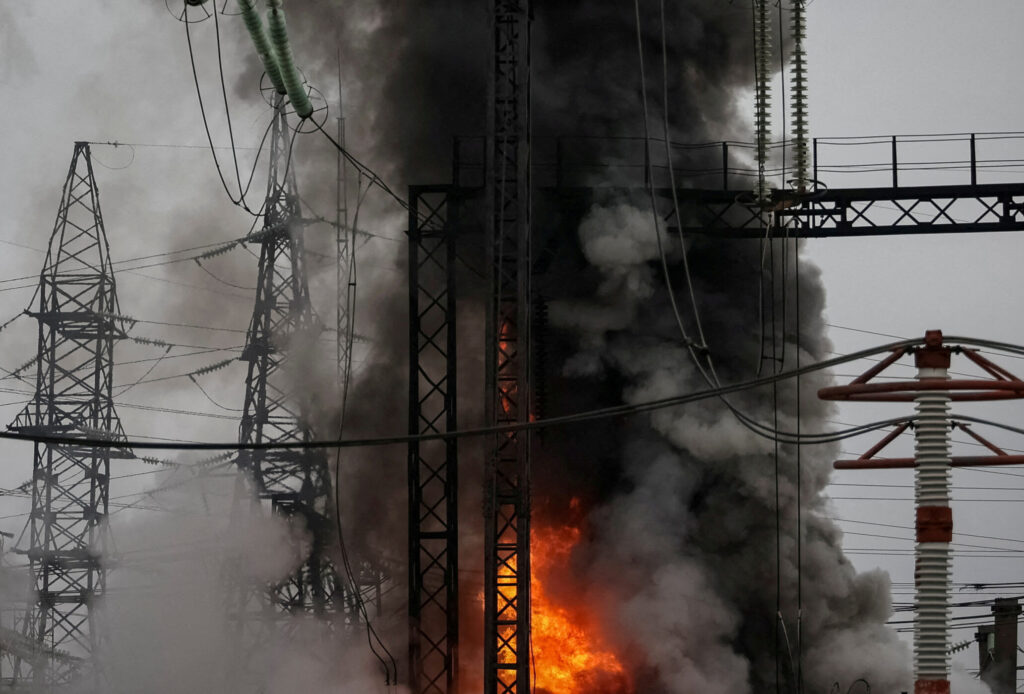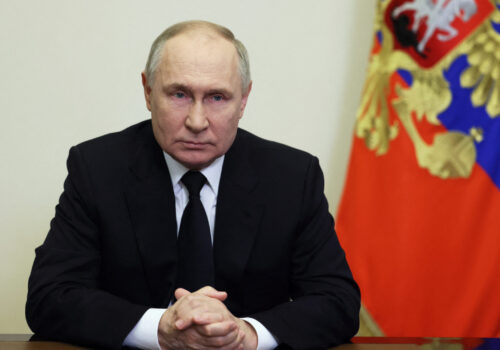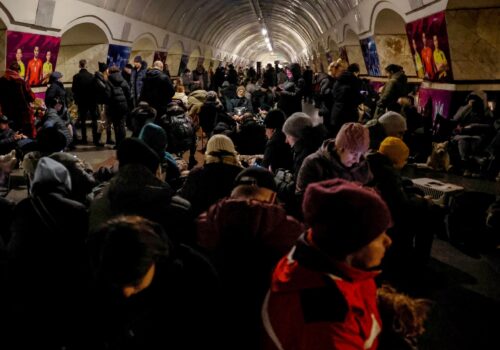A series of Russian drone and missile attacks beginning March 22 has destroyed much of Ukraine’s energy infrastructure. The damage, which will cost billions of dollars and many months to repair, has crippled Ukraine’s ability to light and heat itself for the medium term and marks a major escalation in Russia’s ongoing invasion.
The latest wave of Russian airstrikes has been notable for its breadth. Virtually every one of Ukraine’s thermal power plants has been hit along with a series of substations. DTEK, Ukraine’s largest private power company, reports that two of its thermal power plants (TPP) are no longer operational, with repairs expected to take several years. A separate plant in Kharkiv has also been seriously damaged and will take years to repair, according to regional authorities.
The specific condition of additional Ukrainian power plants remains classified, but reports of recent blackouts in multiple major cities have underlined the extent of the threat to Ukraine’s power grid. In a move indicating the scale of the damage caused by recent Russian bombing, Ukrainian President Volodymyr Zelenskyy has ordered an early end to the country’s heating season.
Stay updated
As the world watches the Russian invasion of Ukraine unfold, UkraineAlert delivers the best Atlantic Council expert insight and analysis on Ukraine twice a week directly to your inbox.
Russian targets in recent days have included the Dnipro Hydroelectric Dam, sparking fears of a possible ecological disaster. The dam itself has not collapsed, but the power plant was partially destroyed and pollutants are now reportedly leaking into the reservoir. Even more worryingly, the nearby Zaporizhzhia Nuclear Power Plant lost grid connectivity due to the attack, putting its cooling systems at risk of stopping. Energoatom called the situation “extremely dangerous.”
In a further escalation, Russia has also expanded its air offensive with attacks on Ukraine’s natural gas storage facilities. These facilities, which house large quantities of gas for European customers, had not previously been targeted in earlier Russian bombing campaigns. Although the storage facilities themselves are underground, the pumping stations that allow for the insertion and extraction of gas are not.
On March 24, Russia launched approximately 20 missiles and drones at the Bilche-Volitsko-Ugerskoye storage facility, which represents around half of Ukraine’s total storage capacity. Ukrainian state-owned gas company Naftogaz downplayed the extent of the damage but did acknowledge that repairs would be necessary. Naftogaz officials also sought to reassure European storage customers that all obligations would be met by Ukraine, regardless of the Russian airstrikes.
Eurasia Center events

The recent wave of Russian attacks on Ukraine’s energy system comes amid reports that the White House has been pressuring Kyiv to stop attacking Russian oil refineries due to concerns about the possible impact on oil prices ahead of the November 2024 US presidential election. Starting in January, Ukraine began a series of long-range drone strikes on refining facilities inside Russia. These attacks have succeeded in hurting Russia’s energy-dependent economy, with disruption reported to oil and oil product exports, gasoline and other fuel supplies in Russia, military fuel supplies, and Russian income from energy exports.
Global prices for crude oil and diesel, as well as other oil products, have risen in the wake of the Ukrainian attacks. This appears to be making US politicians nervous about the potential impact on their country’s forthcoming elections. Unsurprisingly, many in Kyiv have been outraged by the reported US efforts to effectively protect the Russian energy industry at a time when Moscow is bombing Ukraine’s civilian energy infrastructure and plunging entire cities into darkness. Ukrainian officials have responded by insisting Russian refineries are legitimate targets.
So far, there have been no reports of European leaders seeking to deter Ukraine from attacking Russia’s oil and gas industry, but that could change as the continent faces a range of looming geopolitical and energy market problems. Russia’s gas transit contract with Ukraine is set to expire in December 2024, with the Ukrainian authorities stating they will not seek an extension. With the vulnerability of Ukraine’s gas storage facilities now an issue thanks to recent Russian airstrikes, and with instability in the Middle East making Arabian Gulf LNG both less assured and much more expensive, Europe may soon begin to pressure Ukraine, too.
Each wave of Russian airstrikes makes Ukraine’s recovery and reconstruction more challenging while narrowing the options available to the country. Without crucial US military aid that remains held up in Congress, and faced with hypocritical but likely mounting pressure from Western capitals to play nice with Russia on energy infrastructure while Russia decimates Ukraine’s power grid, the path forward is unclear.
Instead of artificial restrictions on their own ability to strike back, Kyiv desperately needs adequate air defense systems so Ukraine can protect its power plants from Russian assaults. In the meantime, the many Ukrainians who are working tirelessly to maintain their country’s battered energy systems have a long road ahead of them.
Suriya Jayanti is a nonresident senior fellow at the Atlantic Council’s Eurasia Center.
Further reading
The views expressed in UkraineAlert are solely those of the authors and do not necessarily reflect the views of the Atlantic Council, its staff, or its supporters.

The Eurasia Center’s mission is to enhance transatlantic cooperation in promoting stability, democratic values and prosperity in Eurasia, from Eastern Europe and Turkey in the West to the Caucasus, Russia and Central Asia in the East.
Follow us on social media
and support our work
Image: Smoke and fire are seen near a high-voltage line at a site of a Russian missile strike, amid Russia's attack on Ukraine, outside Kharkiv. March 22, 2024. (REUTERS/Sofiia Gatilova/File Photo)




